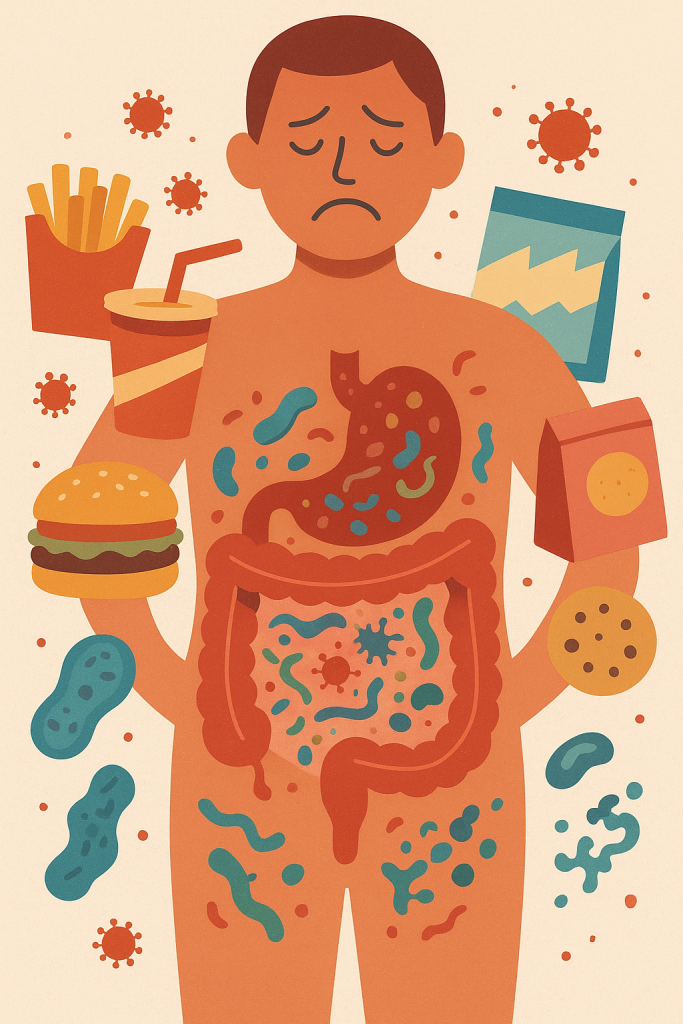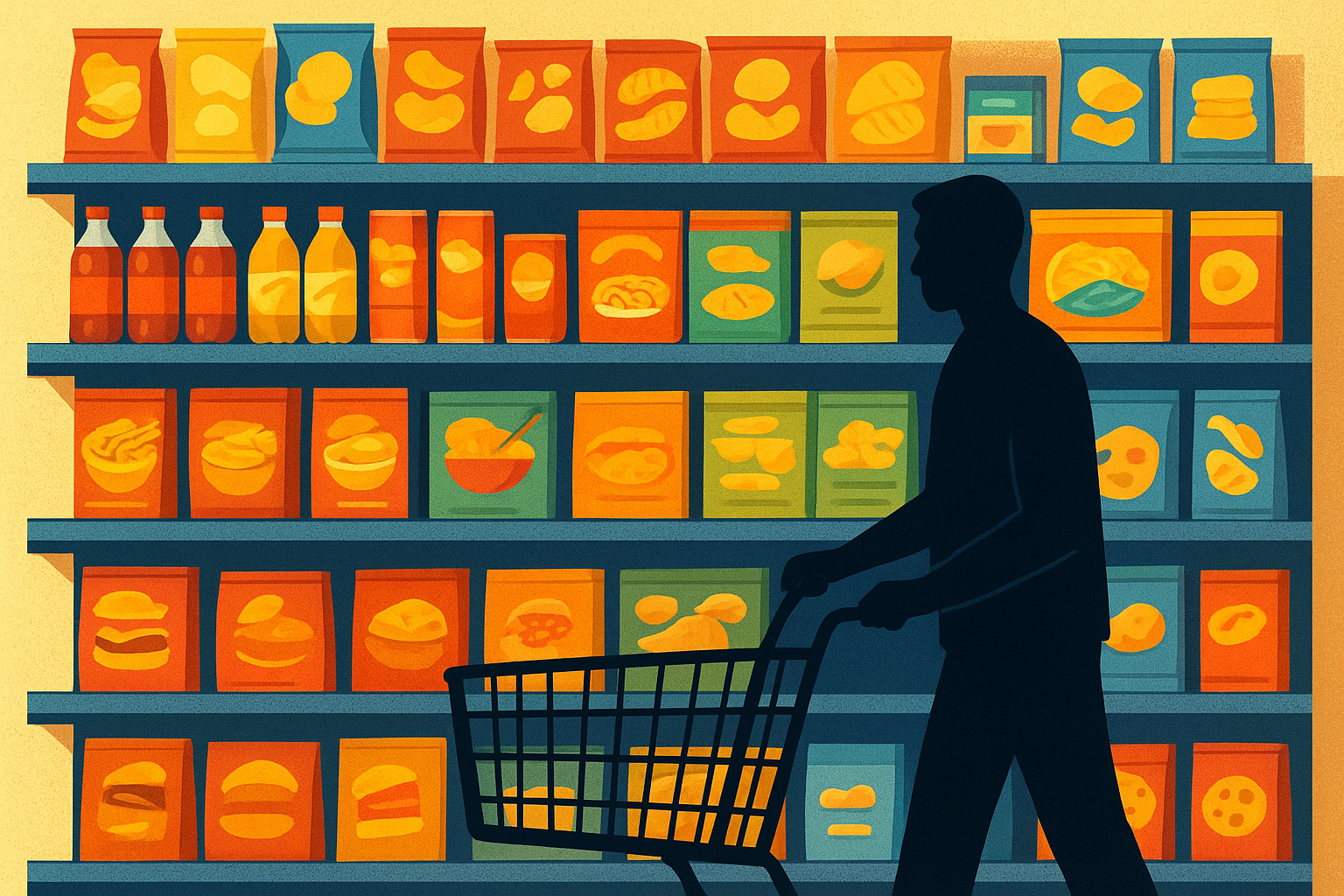You’re likely eating them every day – the foods that promise convenience, taste, and comfort. But beneath the surface, ultra-processed foods are wreaking havoc on your body, quietly disrupting your metabolism, gut health, and even your mood.
Take a walk through any supermarket aisle and you’ll notice something striking: row after row of brightly packaged snacks, fizzy drinks, instant noodles, frozen meals, and ready-to-eat treats.
They’re cheap, convenient, and often taste so good you don’t even pause before tossing them into your cart.
From the office worker grabbing a quick pastry for breakfast to the student living off noodles, ultra-processed foods have become a near-constant part of daily lives.
Here’s the reality many of us would rather ignore:
These foods are doing more than satisfying hunger or saving time. They are reshaping our biology in ways we don’t immediately see.
That late-night soda, that “harmless” pack of cookies, or that microwaved dinner may seem like small indulgences. But together, they act like quiet engineers, tweaking your brain chemistry, confusing your gut, and altering how your body manages energy.
Food has always been more than fuel….it’s a messenger, a powerful tool that communicates directly with our cells, hormones, and even moods.
And while whole foods help the body function as it should, ultra-processed foods send the wrong messages, reprogramming systems that evolved to keep us healthy and balanced.
Ultra-processed foods silently rewires our bodies overtime. It’s gradual, easy to miss, and usually dismissed as “just getting older” or “just being tired.”
But Science is clear: ultra-processed foods are not neutral. They’re active participants in how your body feels, performs, and ages.
So, how exactly are they pulling this off? Let’s break it down.
What Exactly Are Ultra-Processed Foods?
Let’s address this first: not every packaged or processed item is bad. Canned beans, frozen vegetables, or whole-grain bread made with simple ingredients can actually be nutritious. But ultra-processed foods (UPFs) are on a different level.
Food manufacturers design these products in factories using industrial methods and long lists of additives you wouldn’t keep in your kitchen like stabilizers, flavor enhancers, emulsifiers, preservatives, and synthetic colorings.
They often replace real food ingredients with cheaper, lab-made substitutes like high-fructose corn syrup, hydrogenated oils, and protein isolates.
Examples are everywhere, they include: sodas, packaged chips, instant noodles, frozen pizzas, sweetened breakfast cereals, processed meats, candy bars, and even many so-called “diet” or “protein” snacks.
Manufacturers engineer them for taste, shelf life, and profit…..not nourishment.
The problem is that, your body doesn’t recognize these chemical combinations as normal food. And that’s where the rewiring begins.
They Hijack Your Brain’s Reward System
Your brain has an ancient survival system: ie the reward pathways designed to make you seek out calorie-rich foods. In nature, sugar and fat were rare but essential, so our ancestors evolved to crave them. Ultra-processed foods take advantage of this wiring.
With their powerful blends of sugar, fat, and salt, along with additives that amplify flavor, they trigger dopamine surges in the brain.
That’s the same neurotransmitter involved in pleasure and addiction. And the result is that, you’ll start eating not because you’re hungry but because your brain wants another hit of that “feel-good” chemical.
Over time, the constant stimulation dulls your brain’s natural satiety signals. Suddenly, broccoli tastes bland, an apple feels boring, and you can demolish a whole pack of cookies without feeling full. It’s not just a bad habit…it’s brain circuitry being reshaped to prefer ultra-processed options over real food.
They Disrupt Your Gut—and Your Immunity

Your gut is often called your “second brain,” and it’s for a good reason.
It houses trillions of bacteria that influence digestion, immunity, and even mood. A balanced gut microbiome acts like a strong community, each species of bacteria playing its part. But ultra-processed foods throw this ecosystem into chaos.
High sugar feeds harmful bacteria. Artificial sweeteners confuse the balance further, reducing the diversity of beneficial microbes. Emulsifiers and preservatives damage the gut lining, making it more permeable. This so-called “leaky gut” allows unwanted particles into your bloodstream, sparking inflammation throughout the body.
And inflammation is no small matter. Research strongly link them to autoimmune conditions, skin problems, chronic fatigue, and even mental health struggles like depression. In short, what you eat doesn’t just change your digestion, it changes your whole immune response.
They Rewire Your Metabolism
We often blame weight gain on laziness or poor willpower, but the reality is far more complicated. Ultra-processed foods disrupt the body’s finely tuned metabolic system.
Take refined carbs and added sugars: they cause rapid spikes in blood sugar followed by steep crashes. You get bursts of energy, then sudden exhaustion and hunger, which drives you to eat more. Repeat this cycle often enough, and your body edges toward insulin resistance, setting the stage for type 2 diabetes.
Artificial trans fats and chemical additives add another layer of damage by interfering with hormones that regulate appetite. Leptin, the hormone that tells you when you’re full, gets ignored. Ghrelin, the hormone that stimulates hunger, stays louder than it should. It’s like someone cut the wires in your body’s natural hunger-control system.
This isn’t just about gaining weight, it’s about your body losing its ability to manage energy effectively.
They Influence Your Mood and Mental Health
Have you noticed that after a binge on junk food, you don’t just feel sluggish….you feel low? That’s not a coincidence.
Ultra-processed diets are strongly linked to depression, anxiety, and brain fog. Part of the reason is the gut-brain axis. When your gut microbiome suffers, your brain suffers too. Serotonin…the “feel good” neurotransmitter is largely produced in the gut.
A compromised gut means compromised mental health.
Then add inflammation and blood sugar instability, and your brain’s chemistry is in constant turmoil. This explains why people who consume high amounts of UPFs often report poor sleep, irritability, and difficulty concentrating.
Food literally shapes mood, and ultra-processed food often drags it down.
Why It’s So Hard to Quit
At this point, you might think the solution is simple: just stop eating them. But here’s the catch…ultra-processed foods are designed to be addictive.
Food companies pour resources into creating the perfect crunch, the exact sweetness, the smell that lingers just enough to tempt you again.
Bright packaging, strategic advertising, and low prices seal the deal. For many households, they’re not just appealing, they’re the most affordable and available option.
That’s why quitting feels like a battle against more than your cravings. You’re up against powerful industries and ingrained habits. Yet, knowing the science gives you a fighting chance.
Protecting Yourself in a World Full of UPFs
Avoiding ultra-processed foods entirely is nearly impossible. But reducing them and reclaiming your health is very possible. Here’s how:
- Cook more meals at home. Even simple rice and vegetables beat instant noodles loaded with additives.
- Shop the edges of the supermarket. Fresh produce, meats, and dairy are usually around the perimeter, while UPFs dominate the middle aisles.
- Read labels carefully. Long lists of unfamiliar ingredients are red flags.
- Snack smart. Keep fruits, boiled eggs, or nuts handy instead of packaged sweets.
- Drink wisely. Replace sodas and energy drinks with water, coconut water, or unsweetened tea.
- Plan ahead. A little prep reduces the temptation of grabbing whatever’s quick and processed.
These changes may seem small, but they add up. Over time, your body begins to heal, your energy stabilizes, and your cravings shift toward real food.
Why you need myAdvantage
Let’s be real, life happens. Even with healthier choices, health challenges can still catch you off guard. That’s why having a reliable health coverage is non-negotiable.
With myAdvantage health cover, you don’t have to choose between your health and your wallet.
Whether it’s managing diet-related conditions like diabetes and hypertension, getting routine checkups, or accessing emergency care, you’re covered. It gives you peace of mind, knowing you can focus on making better choices without the constant fear of medical bills.
It’s not just a health plan….it’s a safety net while you protect your body from the hidden dangers of ultra-processed foods.
Lastly,
Ultra-processed foods may seem like harmless conveniences, but they’re quietly rewiring your brain, gut, metabolism, and even your mood. The changes are subtle at first, but with time, they become life-altering.
The good news is that you’re not powerless. By understanding how these foods work against your biology, making small shifts toward whole foods, and ensuring you have the right health coverage, you can protect your body and reclaim your well-being.
Because in the end, every bite you take is a message to your body….and it’s up to you whether that message builds you up or slowly breaks you down.

